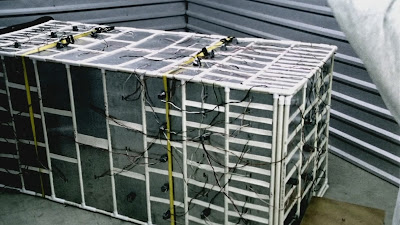I’m
describing what I call my religion, and religions are usually about more than
faith and a sense of awe, so I guess I’ll go in to some of my other beliefs
that are commonly covered by religions.
First should probably be the origin
of the universe. I support the Big Bang, but that is more of a description of
how the universe started and not how it came into being. I use infinite
parallel universes to explain the origin of everything. Most of the infinite
universes are going to have a group of laws and conditions that can’t result in
stability or even any physical existence at all (such as if there was an
inverse cube law instead of our inverse square law, assume a three spatial
dimension universe, obviously), but when you have an infinite number of tries
to make a universe, a few of them are going to end up making sense. I also have
room in this theory for of universes that exist in a stable way, but also have
rules different from our own, which is fantastic. Imagine a universe just like
ours, except the Pythagorean Theorem doesn’t work! Just try to think about that
for a while without giving yourself an aneurism.
 |
| Stay classy geometry |
For the end of the universe I have
beliefs with a similar theme. I accept the scientific theory of a universal
heat death as the progression of entropy reaches a conclusion, but with some
extra bits of my own added on to make things interesting. The extra bits are
the fact that I’m not certain than the Big Bang was a unique event. We could
get another bang every few trillion years (give or take) due to some unknown
spontaneous energy generation (I have faith that matter is energy). The whole
idea of something happening once, and only once, makes me suspicious. Just
because the Big Bang is the only such phenomenon that we know about doesn’t
mean that it is the only one that can or will happen. This is an example of
using skepticism to expand one’s worldview rather than contract it.
Next up should probably be the
afterlife. I’m going to dip into my infinite alternate universe theory again
and pull out something neat. I think it would be endlessly stupendous if every
alternate version of a person collapsed into a semi-collective consciousness
after death. Basically, you would because aware of every other life you could
have lead depending on different choices or circumstances. You would get to
know how your life would have progressed had you gathered the courage to ask
your sweetie to prom, or had been born the son of an absolute monarch in the
middle ages. Extended far enough this would end up giving you complete causal
knowledge of the universe, since you would have witnessed everything and
anything that is capable of happening (because technically everyone is an
alternate version of you). You would get to become Laplace’s Demon upon
death, which isn’t a paradox since you're no longer a causal agent. I like to
maintain a sense of identity in this afterlife, because an exploration of all
possible universes wouldn’t be as good without a solid origin.
 |
| You could meet your evil self! |
Last, I’ll cover my source of
morality. Earlier, I explained how I believed morals to be subjective
depending on the social system in which they exist. A good act is one that
benefits society, and evil the opposite. Assuming the society is one that benefits
you and others anyway, or else the opposite is true (basically you can
overthrow a cruel dictator and it would be good, baring the establishment of an
even worse social system). This carries a bit of a utilitarian aspect to it,
but I don’t get bogged down with trying to weigh alternatives against each
other. I don’t think you can ever sum the pleasures and pains of yourself and
everyone else and come up with a best action. For this reason I think that
intension is more important to morals than consequences. One should just do
one’s best to benefit themselves and those around them, while also trying to do
as little harm as possible. In the end, all this boils down to is "try to be a jerk as little as possible". Things just go better that way. The golden rule is also a good thing to follow.
All in all, I think that does an
okay (if extremely brief) job of answering some of the major questions
typically covered by religions. I’m still not done with this self-adulating
shenanigans, so next time I’ll talk about the aspects of religion that I don't have.




